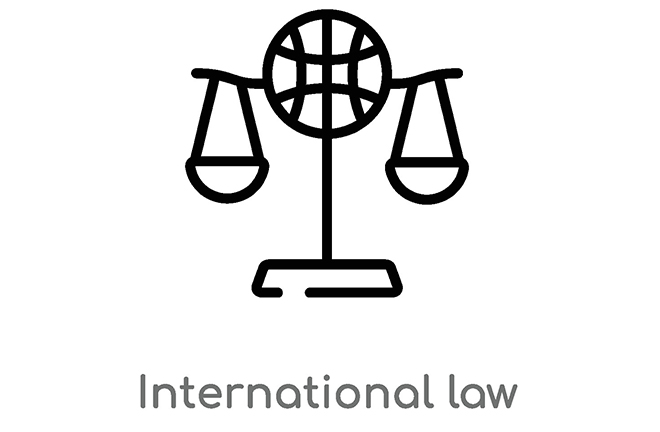International law in the evolving international relations

International law Photo: TUCHONG
In the development process of international relations (IR) as a discipline, international law (IL) has transitioned through the distinct phases of “staging,” “withdrawal,” and “reemergence.”
Staging
The staging phase was characterized by the genesis of the disciplines of IL and IR. IR originated from the study of IL and diplomatic history after the First World War. In 1919, in memory of the young students who lost their lives in the war and in response to then U.S. President Thomas Woodrow Wilson’s advocacy for establishing the League of Nations for world peace, the University of Wales inaugurated the first Chair of International Politics named after Wilson. This marked the official birth of the discipline of IR. The League of Nations advocated for the establishment of a new world order, abandoning the traditional European mechanisms of great power coordination and power balance in favor of dealing with state conflicts in accordance with the principles of IL. In the process of establishing the League, scholars of IL played an important role.
Withdrawal
The withdrawal phase was characterized by the scientificization of IL and IR. If British historian Edward Hallett Carr laid the ideological foundation of the theory of realism in IR, American political scientist Hans J. Morgenthau further built the edifice of realism, significantly diminishing the influence of IL within the discipline. In Morgenthau’s theory, power is the central thread that runs through concepts of human nature, interests, and morality. Gaining, maintaining, and demonstrating power are seen as the essences of IR. Within this theoretical framework, IL is merely the external manifestation and accessory of power.
Reemergence
The reemergence phase saw the diversification of IL and the discipline of IR. In 1984, American political scientist Robert O. Keohane published After Hegemony: Cooperation and Discord in the World Political Economy, marking the arrival of the era of the research on the international institution. This essentially signified the return of IL to the discipline of IR in the name of the international institution, ushering in a phase of diversified development of IR. It needs to be emphasized that compared to traditional IL research, the re-introduced study of the international institution has a strong social science theoretical hue, drawing extensively from economics, sociology, comparative politics and other social sciences, and giving rise to three new institutionalism schools: rational-choice institutionalism, sociological institutionalism and historical institutionalism.
First, by drawing on the transaction cost theory of economics, Keohane founded rational-choice institutionalism, proposing a functionalist theory of the international institution. Keohane emphasized that the function of the international institution in IR is to reduce the transaction costs of interactions between countries, significantly enhancing the possibility of international cooperation. Second, by drawing on theories of socialization from sociology, scholars such as Jeffrey T. Checkel founded sociological institutionalism and proposed a socialization theory of the international institution. Checkel argued that the international institution represents international norms that define appropriate behaviors for states within the international community. In the interactions between countries, countries will socialize common norms of the international community. From the causal mechanism perspective, strategic calculation, role playing and normative persuasion are the three main mechanisms of the socialization of the international institution. Third, the field of IR has also extensively borrowed from comparative politics, forming the theoretical framework of historical institutionalism.
Overall, IL has played varying roles in different stages of the development of the discipline of IR. On one hand, this reflects the complex relationship between power and law in IR. On the other hand, it also reflects the mutual balance sought between the pursuit of scientization and diversification, disciplinary independence and interdisciplinary development.
Zhu Jiejin is a professor at the School of International Relations & Public Affairs at Fudan University.
Edited by ZHAO YUAN

 PRINT
PRINT CLOSE
CLOSE